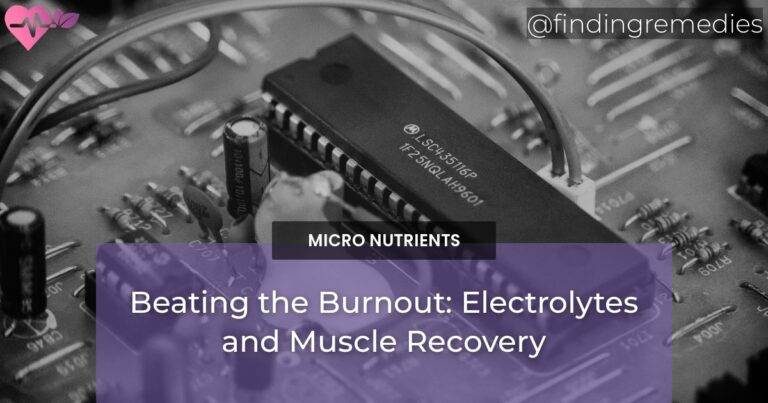Beating the Burnout: Electrolytes and Muscle Recovery
Muscle recovery is a crucial aspect of maintaining a healthy and active lifestyle. However, many people struggle to properly recover from workouts, leading to muscle fatigue and burnout. This is where electrolytes come in as a powerful tool for promoting muscle recovery. In this comprehensive article, we will dive into the role of electrolytes in muscle recovery, their importance in preventing muscle fatigue, the best sources of electrolytes, and holistic approaches to recovery. By understanding the importance of electrolytes, you can take your muscle recovery to the next level and beat the burnout for good.
Electrolytes: The Key to Recovery
Understanding Electrolytes and Their Role in the Body
Electrolytes are essential minerals that carry an electrical charge and are found in bodily fluids. These include sodium, potassium, calcium, magnesium, and chloride. They play a crucial role in maintaining proper fluid balance, nerve and muscle function, and pH levels in the body. When we exercise, we lose these electrolytes through sweat, and it is essential to replenish them for optimal recovery.
Importance of Electrolytes in Muscle Recovery
Electrolytes are vital for muscle recovery as they help regulate muscle contractions and prevent muscle cramps and spasms. They also play a role in transporting nutrients to the muscles, aiding in repair and growth. Additionally, electrolytes help maintain proper hydration levels, which is crucial for recovery. Without adequate electrolytes, muscles can become fatigued, leading to slower recovery times and increased risk of injury.
Preventing Muscle Fatigue: How Electrolytes Can Help
How Electrolytes Help Maintain Muscle Function
Electrolytes are essential for maintaining muscle function, especially during exercise. They help regulate the electrical impulses that control muscle contractions, preventing muscle fatigue and cramping. Without enough electrolytes, muscles may not receive the necessary signals for optimal performance, leading to decreased muscle function and performance.
Electrolyte Imbalance and Its Impact on Muscle Fatigue
Electrolyte imbalances, such as low levels of sodium or potassium, can have a significant impact on muscle fatigue. When electrolyte levels are not balanced, muscles may not receive the proper signals for contraction, leading to muscle fatigue. This can also increase the risk of muscle cramps and spasms, which can hinder recovery and performance.
ALSO READ
Best Electrolyte Sources for Preventing Muscle Fatigue
The best way to replenish electrolytes and prevent muscle fatigue is through a balanced diet and proper hydration. Foods like bananas, avocados, spinach, and nuts are rich in potassium, while sodium can be found in table salt and sports drinks. Magnesium and calcium can be found in leafy greens, legumes, and dairy products. Additionally, electrolyte supplements can be beneficial for replenishing lost electrolytes during intense workouts or in cases of electrolyte deficiencies.
Effective Recovery Meals: The Right Balance of Electrolytes
Importance of Proper Nutrition for Muscle Recovery
Proper nutrition is crucial for muscle recovery as it provides the necessary nutrients for repair and growth. Including electrolyte-rich foods in your recovery meals can help replenish lost electrolytes and promote optimal recovery. Additionally, a balanced meal with a combination of carbohydrates, protein, and healthy fats can aid in muscle repair and reduce inflammation.
Electrolyte-Rich Foods for Optimal Recovery
Including electrolyte-rich foods in your recovery meals can provide a natural and effective way to replenish lost electrolytes. As mentioned, foods like bananas, avocados, spinach, and nuts are excellent sources of potassium, while leafy greens, legumes, and dairy products are rich in magnesium and calcium. Adding a pinch of sea salt to your meals can also help replenish sodium levels.
Electrolyte Supplements for Muscle Recovery
In addition to consuming electrolyte-rich foods, electrolyte supplements can also be beneficial for muscle recovery. These supplements usually come in the form of powders or tablets and can be easily added to water for a quick and convenient way to replenish lost electrolytes. However, it is essential to choose a reputable supplement and consult with a healthcare professional before adding them to your routine.
Holistic Approaches to Muscle Recovery
The Mind-Body Connection in Recovery
Recovery is not just about physical rest and nutrition; it also involves the mind. Stress and mental fatigue can also hinder muscle recovery and lead to burnout. Incorporating mindfulness techniques such as meditation, yoga, or deep breathing can help reduce stress and promote overall well-being, aiding in muscle recovery.
Stress Management Techniques for Better Recovery
Stress management techniques, such as journaling, talking to a therapist, or engaging in a hobby, can also help reduce stress levels and promote better muscle recovery. It is essential to find what works best for you and incorporate it into your recovery routine.
Incorporating Rest and Relaxation into Your Recovery Routine
Rest and relaxation are vital for muscle recovery. It is essential to listen to your body and take breaks when needed. Adequate sleep and rest days are crucial for allowing the body to repair and replenish itself, leading to better muscle recovery and preventing burnout.
The Role of Mental Health in Muscle Recovery
Mental health plays a significant role in muscle recovery. It is essential to prioritize self-care and seek help if you are struggling with stress, anxiety, or other mental health issues. Taking care of your mental well-being can help promote a more effective and sustainable muscle recovery routine.
Conclusion: Beating Burnout with Electrolytes
Electrolytes play a crucial role in muscle recovery, making them a valuable tool in preventing burnout and promoting overall muscle health. By understanding the role of electrolytes, incorporating them into your recovery meals, and practicing holistic approaches to recovery, you can take your muscle recovery to the next level and beat the burnout for good. Remember to listen to your body, prioritize self-care, and seek professional help when needed for optimal muscle recovery and overall well-being.
RELATED ARTICLES:

